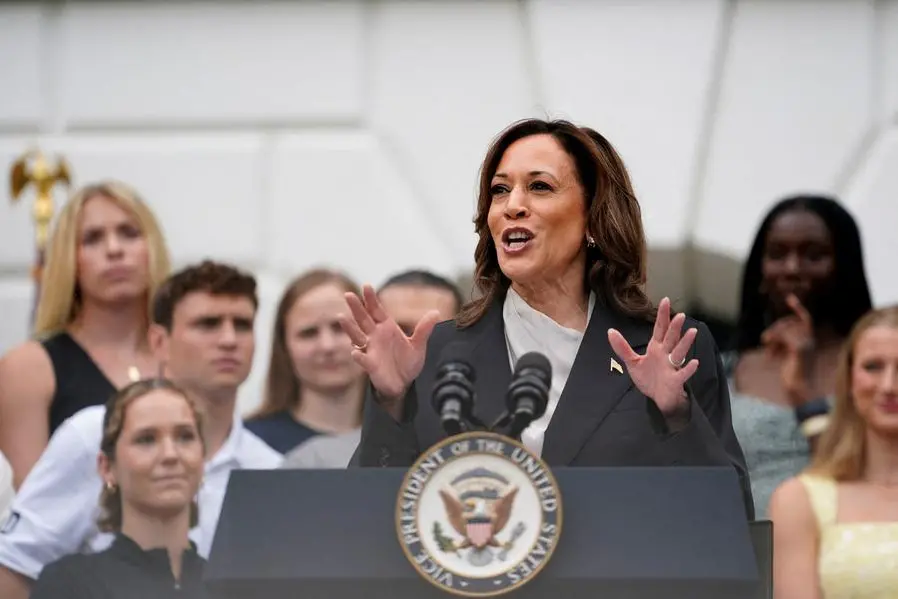PHOTO
A potential Democratic administration led by Vice President Kamala Harris would likely advance President Joe Biden's agenda of tough financial rules, an unwelcome prospect for Wall Street banks, crypto companies and other players that have chafed under the current administration.
Harris is the frontrunner to win the Democratic nomination after Biden exited the presidential race on Sunday and endorsed her.
While Harris has had a low profile when it comes to the administration's financial policies, her track record taking on Wall Street banks and voting against deregulation suggests she would continue with Biden's ambitious agenda, said analysts.
The Biden administration agenda has included both adopted and proposed rules cracking down on bank fees, non-bank lenders and medical debt providers, requiring more transparency from hedge funds, as well as hikes in the amount of capital banks must hold and a slew of enforcement actions against major cryptocurrency firms.
"Harris is farther to the left than Biden, but the Biden administration has proven to be incredibly progressive, so there shouldn't be much daylight between a second Biden administration and a first Harris administration," Isaac Boltansky, director of policy research at brokerage BTIG, wrote in a note on Monday.
A spokesperson for Harris did not immediately provide comment on her potential agenda on financial regulation.
Among prominent progressive Democrats who have endorsed Harris is Senator Elizabeth Warren, who has helped shape Biden's financial regulatory agenda and who has not been shy of criticizing fellow Democrats she sees as soft on Wall Street.
"We view this as boosting risk for financials and crypto," TD Cowen analyst Jaret Seiberg wrote on Monday of Harris, adding that a second Democratic administration would finalize the Basel capital rules and a requirement that banks hold more long-term debt, and advance limits on overdraft and other fees.
To be sure, Harris is not yet the Democratic nominee and the details of financial regulation policy would be overseen by the agency picks. One former administration official noted that while Harris has been tough on banks in the past, she was not as left leaning on financial regulation issues as Warren.
Several major Wall Street names plan to support Harris for the Democratic nomination, Semafor reported on Sunday. A source familiar with the matter said that Peter Orszag and Ray McGuire at Lazard would donate to Harris, confirming parts of that report.
On Monday, investors unwound some of the so-called Trump-bond market trades that had bet on a Trump victory, "but he’s still the favorite," said Paul Mielczarski, head of macro strategy at Brandywine Global.
"WALL STREET GREED"
Harris rose to prominence as the attorney general of California, where she took a tough hand with big banks.
In 2011, she negotiated hard for banks to commit more cash to help consumers harmed by predatory lending in the lead-up to the 2007-09 financial crisis. In 2016, her office launched a criminal investigation into Wells Fargo's fake accounts scandal.
The former administration official praised her work as California's AG and noted that Harris tapped Katie Porter, then a law professor, to oversee that $18 billion bank settlement to help homeowners. Porter later served in Congress where she took on big bank CEOs and called out Trump's deregulation.
As a senator, Harris in 2018 sided with Warren and other progressives in voting against a bill rolling back rules introduced following the financial crisis. The Federal Reserve subsequently blamed that change for contributing to last year's failure of Silicon Valley Bank.
"Wall Street greed and abuse crashed our economy in 2008. I will fight against any legislation to deregulate the Big Banks," Harris posted on X, then Twitter, as the negotiations heated up.
As vice president, Harris last year spearheaded a Consumer Financial Protection Bureau (CFPB) initiative to remove medical debt from consumer credit reports, and in July endorsed a CFPB proposal requiring that mortgage servicers help struggling borrowers.
Big banks have loudly criticized the CFPB under its Biden-nominated director Rohit Chopra and have sued the agency to reverse several of its rules.
"Given that the CFPB Director serves at the pleasure of the president, a Democrat in the White House will give Director Chopra wide latitude on credit cards, payment companies, BigTech, and everything else under the Bureau's umbrella," BTIG's Boltansky wrote.
(Reporting by Michelle Price, Pete Schroeder, Douglas Gillison, Chris Prentice, Megan Davies, Nupur Anand, Lananh Nguyen and David Randall; Writing by Michelle Price; Editing by Leslie Adler)





















